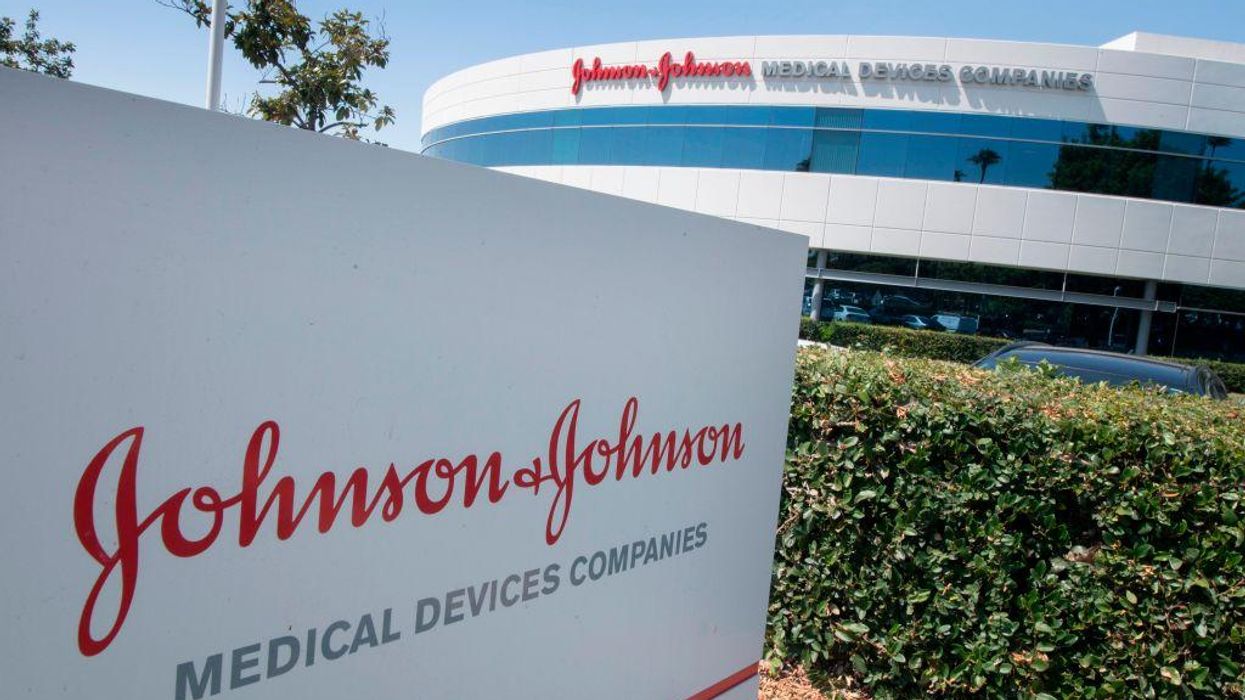
MARK RALSTON/AFP via Getty Images

A subsidiary of Johnson & Johnson has agreed to pay nearly $10 million over accusations that the pharmaceutical company broke state and federal law by providing illicit kickbacks to a surgeon.
DePuy Synthes is a company that specializes in medical devices primarily designed for orthopedic, joint reconstruction, trauma, craniomaxillofacial, spinal surgery, and sports medicine applications. DePuy Synthes was acquired by Johnson & Johnson in 1998.
Between 2013 and 2018, DePuy Synthes gave a Massachusetts surgeon surgical implants and instruments for spinal surgeries worth approximately $100,000.
U.S. attorney Rachael S. Rollins said, "Today the United States resolves allegations that DePuy provided over $100,000 worth of free product to a surgeon in order to secure and reward that physician’s continued business."
The surgeon — whose name was redacted — performed more than 20 surgeries during the time period in Bahrain, Saudi Arabia, Kuwait, Lebanon, the United Arab Emirates, and Qatar.
The United States Attorney's Office declared in a statement, "In many of these surgeries, the surgeon used DePuy products, worth thousands of dollars, that DePuy sales representatives had provided to him. The DePuy products that DePuy gave to the surgeon were sometimes not available at the hospitals and/or with the third-party sales distributors in the countries where the surgeon operated overseas."
The statement noted, "DePuy did not request or receive payment from the surgeon, the hospitals, or the third-party sales distributors in the countries where the surgeon operated overseas; nor did the surgeon, the overseas hospitals, the third-party sales distributors, or anyone else, pay DePuy for the products that it gave to the surgeon and the surgeon used abroad."
Prosecutors accused DePuy Synthes of violating the Anti-Kickback Statute and the False Claims Act by providing the surgeon with free medical products.
The federal Anti-Kickback Statute is a "criminal statute that prohibits the exchange (or offer to exchange), of anything of value, in an effort to induce (or reward) the referral of business reimbursable by federal healthcare programs."
The False Claims Act is a federal statute that states, "Any person who knowingly submitted false claims to the government was liable for double the government’s damages plus a penalty of $2,000 for each false claim," according to the Department of Justice.
Rollins said of the allegations, "Unlawful kickbacks can severely distort medical judgment as well as the market for medical devices. The millions of patients that depend on our healthcare system deserve untainted medical decisions. This settlement reflects our commitment to stamping out illegal kickbacks."
Phillip M. Coyne, special agent in charge of the U.S. Department of Health and Human Services, Office of Inspector General, said, "The American people, as both taxpayers and consumers, expect medical device manufacturers like DePuy to abide by relevant laws and regulations. When such healthcare companies provide illegal kickbacks in order to boost profits, their actions erode public confidence in the health care system, can compromise the patient-physician relationship, and waste government health program funding."
Joseph R. Bonavolonta, special agent in charge of the Federal Bureau of Investigations, Boston Division, called DePuy's actions an attempt to "boost their bottom line through illegal kickback schemes."
Johnson & Johnson, DePuy Synthes, Inc., and DePuy Synthes Sales, Inc. have settled and agreed to pay about $9.75 million to resolve the accusations.
The Associated Press reported, "About $7.2 million of the $9.75 million settlement will go to the federal government, and about $2.5 million to the state. More than $1.8 million of the federal portion will go to the whistleblower who brought the original suit in 2017 under a legal provision that lets private parties sue on behalf of the government and share in any recovery."
Johnson & Johnson issued a statement on the settlement, "We have fully cooperated with the government throughout its investigation of the allegations and were credited for that cooperation in the settlement. This settlement avoids further lengthy legal processes. We are committed to ensuring our employees conduct business in a way that complies with our credo and with all laws and regulations."
Like Blaze News? Bypass the censors, sign up for our newsletters, and get stories like this direct to your inbox. Sign up here!